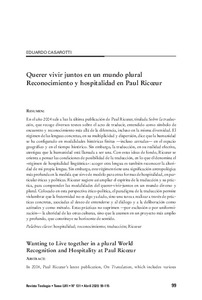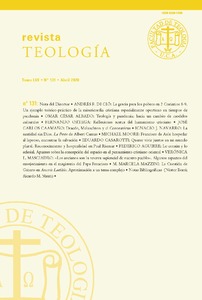Please use this identifier to cite or link to this item:
https://repositorio.uca.edu.ar/handle/123456789/10018| Título: | Querer vivir juntos en un mundo plural : reconocimiento y hospitalidad en Paul Ricoeur Wanting to live together in a plural world : recognition and hospitality at Paul Ricoeur |
Autor: | Casarotti, Eduardo | Palabras clave: | HOSPITALIDAD; RECONOCIMIENTO; Ricoeur, Paul, 1913-2005; TRADUCCION; LINGÜISTICA; ETICA | Fecha de publicación: | 2020 | Editorial: | Universidad Católica Argentina. Facultad de Teología | Cita: | Casarotti, E. Querer vivir juntos en un mundo plural : reconocimiento y hospitalidad en Paul Ricoeur. [en línea]. Teología. 2020, 57 (131) Disponible en: https://repositorio.uca.edu.ar/handle/123456789/10018 | Resumen: | Resumen: En el año 2004 sale a luz la última publicación de Paul Ricoeur, titulada Sobre la traducción,
que recoge diversos textos sobre el acto de traducir, entendido como símbolo de
encuentro y reconocimiento más allá de la diferencia, incluso en la misma diversidad. El
régimen de las lenguas concretas, en su multiplicidad y dispersión, dice que la humanidad
se ha configurado en modalidades históricas finitas —incluso cerradas— en el espacio
geográfico y en el tiempo histórico. Sin embargo, la traducción, en su realidad efectiva,
atestigua que la humanidad está llamada a ser una. Con estas ideas de fondo, Ricoeur se
orienta a pensar las condiciones de posibilidad de la traducción, en lo que él denomina el
«régimen de hospitalidad lingüística»: acoger otra lengua es también reconocer la alteridad
de mi propia lengua. Sin embargo, este régimen tiene una significación antropológica
más profunda en la medida que sirve de modelo para otras formas de hospitalidad, en particular
éticas y políticas. Ricoeur sugiere así ampliar el espíritu de la traducción y su práctica,
para comprender las modalidades del querer-vivir-juntos en un mundo diverso y
plural. Colocado en esta perspectiva ético-política, el paradigma de la traducción permite
vislumbrar que la fraternidad no es algo ya dado, sino una tarea a realizar a través de prácticas
concretas, asociadas al deseo de entenderse y al diálogo y a la deliberación como
actitudes y como método. Estas prácticas no suprimen —por exclusión o por uniformización—
la alteridad de las otras culturas, sino que la asumen en un proyecto más amplio
y profundo, que constituye su horizonte de sentido. Abstract: In 2004, Paul Ricoeur’s latest publication, On Translation, which includes various texts on the act of translating, understood as a symbol of encounter and recognition beyond differences and diversity, comes to light. The regime of concrete languages, in its multiplicity and dispersion, states that humanity has been configured in finite — and even closed— historical modalities both in geographical space and in historical time. However, translation, in its effective reality, attests that humanity is called to be one. With these basic ideas, Ricoeur thinks about the conditions of possibility of the act of translating, in what he calls the “regime of linguistic hospitality”: welcoming another language also implies recognizing the otherness of my own language. However, this regime has a deeper anthropological significance to the extent that it serves as a model to other forms of hospitality, particularly ethical and political ones. Ricoeur thus suggests expanding the spirit of translation and its practice, in order to understand the “will of living together” in a diverse and plural world. Placed in this ethicalpolitical perspective, the translation paradigm allows us to discern that fraternity is not something already given, but a task to be performed through concrete practices, associated with the desire to understand each other and embrace dialogue and deliberation as a method and approach. These practices do not suppress —by exclusion or by standardization— the otherness of other cultures, but instead assume it in a broader and deeper project, which constitutes their horizon of meaning. |
URI: | https://repositorio.uca.edu.ar/handle/123456789/10018 | ISSN: | 0328-1396 (impreso) 2683-7307 (on line) |
Disciplina: | TEOLOGIA | Derechos: | Acceso abierto | Fuente: | Teología. Tomo 57, No.131, 2020 |
| Appears in Collections: | TEO - 2020 Tomo LVII nro. 131 |
Files in This Item:
| File | Description | Size | Format | |
|---|---|---|---|---|
| querer-vivir-juntos-mundo (1).pdf | 138,08 kB | Adobe PDF |  View/Open | |
| Teología131 (2).jpg | 257,68 kB | JPEG |  View/Open |
Page view(s)
172
checked on Apr 27, 2024
Download(s)
233
checked on Apr 27, 2024
Google ScholarTM
Check
This item is licensed under a Creative Commons License

